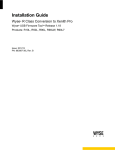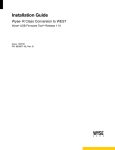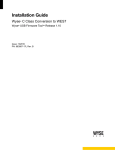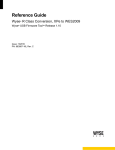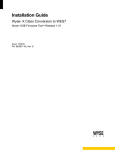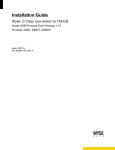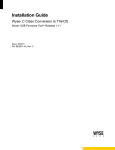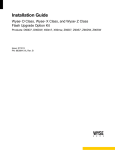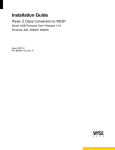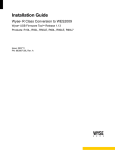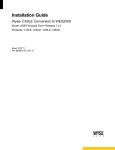Download Dell Wyse ZX0D ThinOS conversion kit, MNT
Transcript
Installation Guide Wyse Z Class Conversion to ThinOS ® Wyse® USB Firmware ToolTM Release 1.19 Products: Z50D, Z50S, Z90D7, Z90D7B, Z90D7p, Z90DE7, Z90DE7p, Z90DEW, Z90DW, Z90S7, Z90S7p, Z90SW Issue: 080113 PN: 883887-33L Rev. A Copyright Notices © 2013, Wyse Technology LLC. All rights reserved. This manual and the software and firmware described in it are copyrighted. You may not reproduce, transmit, transcribe, store in a retrieval system, or translate into any language or computer language, in any form or by any means, electronic, mechanical, magnetic, optical, chemical, manual or otherwise, any part of this publication without express written permission. End User License Agreement (“License”) A copy of the Wyse Technology End User License Agreement is included in the software and provided for your reference only. The License at http://www.wyse.com/license as of the purchase date is the controlling licensing agreement. By copying, using, or installing the software or the product, you agree to be bound by those terms. Trademarks The Wyse and PocketCloud logos and Wyse and PocketCloud are trademarks of Wyse Technology LLC. Other product names mentioned herein are for identification purposes only and may be trademarks and/or registered trademarks of their respective companies. Specifications subject to change without notice. Restricted Rights Legend You acknowledge that the Software is of U.S. origin. You agree to comply with all applicable international and national laws that apply to the Software, including the U.S. Export Administration Regulations, as well as end-user, end-use and country destination restrictions issued by U.S. and other governments. For additional information on exporting the Software, see http://www.microsoft.com/exporting. Ordering Information For availability, pricing, and ordering information in the United States and Canada, call 1-800-GET-WYSE (1-800-438-9973) or visit us at wyse.com. In all other countries, contact your sales representative. Contents 1 Introduction 1 Kit Contents 1 Wyse Technical Support 2 Related Documentation and Services Wyse Online Community 2 2 2 Converting Wyse Z Class to ThinOS 3 Requirements 3 Procedures 4 Troubleshooting 10 USB Keys - Troubleshooting Boot Issues 10 SanDisk Cruiser Flash Drives - Troubleshooting Partition Issues 10 iv Contents This page intentionally blank. 1 Introduction This guide provides the instructions you need to install and use Wyse® USB Firmware ToolTM to convert the following Wyse D class thin clients to ThinOS: • Z50D • Z90D7 • Z90D7p • Z90DE7p • Z90DW • Z90S7p • Z50S • Z90D7B • Z90DE7 • Z90DEW Z90S7 • Z90SW • WARNING: ThinOS v8.0_037 conversion Does Not support: • Wireless (after conversion, Wireless will not work on Wireless devices). · No support for the Intel or Atheros wireless chipsets that are included in devices running Windows and Linux operating systems. · If you require Wireless, you can purchase a Z10D IW (PN#909673-01L). • USB 3.0 ports (after conversion, ports will function as USB 2.0 ports). • TPM functionality (after conversion, TPM will not work on TPM devices). Kit Contents The conversion kit includes: • 1 Year ThinOS Maintenance (you will receive an email from Wyse or your reseller with full instructions) • Conversion Software Assembly DVD-ROM • Wyse Conversion Labels (you must attach a Wyse label to each converted thin client) Figure 1 Kit contents 2 Chapter 1 The Conversion Software Assembly DVD-ROM contains: • A PDF of this Reference Guide • Wyse USB Firmware Tool Release 1.19 • Z Class ThinOS Conversion Image folder containing the following files: • · bios.img · commandsXml.xml · par1.img Z Class ThinOS 3.0D BIOS Image folder containing the following files: · bios.img Wyse Technical Support To access Wyse technical resources, visit http://www.wyse.com/support. If you still have questions, you can submit your questions using the Wyse Self-Service Center at http://support.wyse.com/selfservice.html or call Customer Support at 1-800-800-WYSE (toll free in U.S. and Canada). Hours of operation are from 6:00 A.M. to 5:00 P.M. Pacific Time, Monday through Friday. To access international support, visit http://www.wyse.com/global. Related Documentation and Services Fact Sheets containing the features of hardware products are available on the Wyse Web site. Go to http://www.wyse.com/products and use the Cloud clients tab to locate and download the Fact Sheet for your hardware product. Administrator and other documentation for your cloud client model are available at: http://www.wyse.com/manuals. Wyse Online Community Wyse maintains an online community where users of our products can seek and exchange information on user forums. Visit the Wyse Online Community forums at: http://community.wyse.com/forum. 2 Converting Wyse Z Class to ThinOS This chapter includes the requirements and procedures you need to install and use Wyse® USB Firmware ToolTM to update your thin client to ThinOS firmware. TIP: The purpose of the Wyse USB Firmware Tool is to configure a bootable USB key for device firmware. In the following procedures, you will create two configured USB keys containing the firmware contents that you need, and then boot from these configured USB keys on the thin clients you want to convert to push the contents of the USB key onto these target devices. EXTREEMLY IMPORTANT: You must perform the steps to create and use the two configured USB keys on each thin client as noted. You cannot completely convert one thin client and then use the USB Firmware Tool to pull and push that image to your other thin clients. Requirements • Windows Server 2008 R2 SP1 • Windows 7 Enterprise (32-bit and 64-bit) • Windows 7 Ultimate (32-bit and 64-bit) • 2 USB Keys: · • USB 2.0 only Each USB key size should be 16 GB (see also "USB Keys - Troubleshooting Boot Issues") CAUTION: During the USB key configuration process the USB keys will be reformatted. 4 Chapter 2 Procedures IMPORTANT: Complete the following procedures as an administrator (administrator privileges are required). Step 1: Copy the Z Class ThinOS Conversion Image Folder and Z Class ThinOS 3.0D BIOS Image Folder to Your Local Hard Drive Navigate to the Z Class ThinOS Conversion Image folder and the Z Class ThinOS 3.0D BIOS Image folder (contained on the Conversion Software Assembly DVD-ROM) and copy them to your local hard drive. Step 2: Install Wyse USB Firmware Tool v1.19.0.4 1. Navigate to the Wyse USB Firmware Tool v1.19.0.4_GA.exe (contained on the Conversion Software Assembly DVD-ROM) and double-click it to execute the file and open the WinZip Self-Extractor dialog box. 2. Enter the destination folder you want (for example, C:\USBFT) in the Unzip to folder box, and then click Unzip to extract all files from the Wyse USB Firmware Tool v1.19.0.4_GA.exe file into the folder. The default directory for the extracted files is Wyse USB Firmware Tool. CAUTION: It is not recommended to use your desktop for the destination folder as there are several files that will be extracted from the .exe file. 3. After installation, create a shortcut on the desktop for the Wyse USB Firmware Tool.exe file (see your operating system documentation). Step 3: Use Wyse USB Firmware Tool to Configure a Single USB Key that will Push Firmware CAUTION: Complete the configuration procedures as an administrator. For Windows 7 Enterprise and Windows 7 Ultimate, right-click on Wyse USB Firmware Tool.exe and select the Run as administrator option. 1. Right-click the shortcut on the desktop for the Wyse USB Firmware Tool.exe file and select Run as administrator to run the tool and open the Wyse USB Firmware Tool wizard (the welcome page provides the product version and description, and a link to view the Wyse end user license agreement). Figure 2 Wyse USB Firmware Tool wizard 2. Click Next to open the Select an Option dialog box. Converting Wyse Z Class to ThinOS Figure 3 5 Configuration options 3. Select the Configure the USB key to Copy/Pull or to Update/Push firmware option, and then click Next to open the Select the Configuration dialog box. Figure 4 Update firmware options 4. Select the WTOS/Xenith/Xenith Pro operating system (OS) type option (note that OS Image, BIOS, and CMOS are selected by default). 5. Select the Update or Push Firmware operation to perform option. 6. Click Next to open the browse dialog box. Figure 5 Browse for image file 7. Click Browse. 6 Chapter 2 Figure 6 Browse to select commandsXml.xml 8. Navigate to the Z Class ThinOS Conversion Image folder on your hard drive (this is the location you selected in "Step 1: Copy the Z Class ThinOS Conversion Image Folder and Z Class ThinOS 3.0D BIOS Image Folder to Your Local Hard Drive"), click on the commandsXml.xml file to select it (you may need to select the All Files option from the Files of Type box to display the commandsXml.xml file for selection), and then click Open. CAUTION: Be sure to use the commandsXml.xml file you extracted in "Step 1: Copy the Z Class ThinOS Conversion Image Folder and Z Class ThinOS 3.0D BIOS Image Folder to Your Local Hard Drive." DO NOT use the commandsXml.xml file directly from the Conversion Software Assembly DVD-ROM. 9. In the browse dialog box, click Next to open the Prepare the USB Drive dialog box. Figure 7 Prepare USB key for configuration 10.Select the USB key onto which you want the configurations (you can use Refresh as needed to recognize an inserted USB key), and then click Next. The progress bars show the overall (formatting and configuration) progress and task progress. CAUTION: DO NOT interrupt the formatting and configuration process. All process requirements are done automatically. 11. After configuration, click Finish to close the wizard and then remove the configured USB key for use (you will use the configured USB key on your target devices). TIP: At this time you can also replicate/duplicate the configured USB key (containing the firmware you want to push) for simultaneous usage on target devices (by users in several locations at the same time). For full Wyse USB Firmware Tool details, see Users Guide: Wyse® USB Firmware Tool 1.19. Converting Wyse Z Class to ThinOS 7 Step 4: Use the Configured USB Key to Install Firmware on Each Thin Client In this step, you will boot each thin client you want to convert from the configured USB key so that the USB key will push the contents from the USB key onto the target device. NOTE: BIOS selection, movement, and exit instructions are displayed in the BIOS window. 1. Be sure the client is shut down and disconnected from any network. 2. Insert the configured USB key into a thin client USB 2.0 port. 3. Power on the thin client and during boot, press and hold the Delete key. 4. Enter the password Fireport (this is case sensitive) and press Enter. 5. Select the Advanced tab. 6. Using the down arrow key, select the Boot from USB option and press Enter. 7. Select the Enabled option and press Enter. 8. Select the Boot tab. 9. Select the USB HDD option (displaying your USB key vendor name) and move it to the Boot Priority Order 1 position by using the + key. 10.Press the F10 key to save, exit, and reboot the client from the configured USB key. When booting a target device from the configured USB key (containing the contents to be pushed to a target device), you will be prompted to continue with the push process (to continue, type y and press Enter). Once the push process is complete, you must reboot (press Enter and remove the USB key). CAUTION: DO NOT interrupt the installation/conversion process. All process requirements are done automatically. Some screens may display for several seconds during the process. 11. After a target device completes the installation/conversion process and displays the ThinOS desktop, continue with "Step 5: Verifying Thin Client Operation." TIP: You can use the configured USB key to push the firmware onto as many target devices as you want (repeat "Step 4: Use the Configured USB Key to Install Firmware on Each Thin Client"). Step 5: Verifying Thin Client Operation After the thin client displays the ThinOS desktop, you can verify the System Version and that your general system information is correct: • Classic Desktop - Click System Information in the Desktop Menu. • Wyse Zero Desktop - Click the System Information icon on the Wyse Zero Toolbar. 1. On the General tab of the System Information window, verify the following: • System Version is 8.0_037. 2. After verification, close the System Information window. 8 Chapter 2 Step 6: Update the BIOS on Each Converted Thin Client In this step you will use the USB Firmware Tool to update the BIOS of each thin client to BIOS version 3.0D. To do this, you must repeat the following steps on a separate (second) USB key using the commandsXml.xml file located in the Z Class ThinOS 3.0D BIOS Image folder on your hard drive (this is the location you selected in "Step 1: Copy the Z Class ThinOS Conversion Image Folder and Z Class ThinOS 3.0D BIOS Image Folder to Your Local Hard Drive"): 1. "Step 3: Use Wyse USB Firmware Tool to Configure a Single USB Key that will Push Firmware" 2. "Step 4: Use the Configured USB Key to Install Firmware on Each Thin Client" 3. "Step 5: Verifying Thin Client Operation" 4. After verifying thin client operation, verify the BIOS version by doing the following: Reboot your thin client and you will see a Wyse logo for a short period of time. During this period you can press and hold the Delete key to enter the BIOS to view the BIOS version (enter Fireport as the password). Be sure the BIOS version is 3.0D (you can also note that for security, the Boot from USB option is disabled by default). After verification, close the BIOS. The thin client is ready for operation and setup by an administrator. TIP: For more information, see Administrators Guide: Wyse ThinOS™. Administrator and other documentation for your thin client model are available at: http://www.wyse.com/manuals. Step 7: Attach a Wyse Conversion Label on Each Converted Thin Client The conversion kit is supplied with Wyse Conversion Labels that must be attached to each thin client. Be sure you have purchased the amount of labels you need. CAUTION: Failure to install the labels may cause delays in service and support. The serial number must be given to a Customer Support Technician to validate entitlement to support and service from Wyse. Failure to do so will result in the original operating system being loaded on the device and is in breach of your license agreement. Figure 8 Placement of Wyse Conversion Label (blank example) Converting Wyse Z Class to ThinOS 9 Step 8: Obtain a Firmware Update If you are under a Wyse maintenance contract, you can download ThinOS software updates from your My Downloads page in the Wyse Self-Service Center at http://support.wyse.com/selfservice.html. If you are not under maintenance and wish to gain access to ThinOS software updates, you must complete a product registration: 1. After purchase, you will receive an e-mail containing your software Registration Code. 2. Go to the Wyse Self-Service Center at http://support.wyse.com/selfservice.html and log in (or register and log in). 3. On the Home tab under Support Resources, click the Registration, Licenses & Downloads (**New) link to open the Registration, Licenses & Downloads page of the Support and Service Center tab. 4. Enter the Registration Code that you received from Wyse for your purchase in the Enter Registration Code box and click Register. After the process is complete, the products you registered will display on the page. 5. Activate your software maintenance: Click Activate in the Software Maintenance list. 6. Download your software: On the page displaying the products you registered, select Support and Service Center tab > Registration, Licenses & Downloads to open the Registration, Licenses & Downloads page, hover your mouse pointer over the My Downloads link and select ThinOS to display available firmware, click the zip file you need (for example, Z10D_8.0_037.zip), and then follow the download instructions. CAUTION: Be sure to select the option in the Z10D_8.0_037.zip file that you need. For example: If you are using an FTP server to update your firmware, be sure to use the ZD10_wnos file. If you are using the USB Firmware Tool to update your firmware, be sure to use the Z10-8.0_037-2G-Merlin.zip file. WARNING: Use of the Software on more than one device requires that you first purchase from Wyse additional copies of, or licenses to, the Software. Contact your local Wyse distributor or Wyse Inside Sales at 1-800-800-9973 option 1 or 1-408-473-1200 option 1. 10 Chapter 2 Troubleshooting This section contains general troubleshooting information. USB Keys - Troubleshooting Boot Issues Due to different manufacturing processes on USB keys (and the variety of them), not all brands have been tested with the Wyse USB Firmware Tool. If you experience problems booting from a configured USB key, it is recommended that you try a different brand of USB key. SanDisk Cruiser Flash Drives - Troubleshooting Partition Issues Problem: How can I properly use a SanDisk Cruiser flash drive to image supported devices using the Wyse USB Firmware Tool? (KB17735) Solution: SanDisk flash drives come with support for U3 (for details on U3, see http://u3.sandisk.com). When you initially use these drives, you are prompted to select the use for the drive: Apps and Storage or only Storage. If you select the Apps and Storage option, the drive will create two partitions, one of which is identified as a CD and is a read only partition. This partition sometimes prevents the Wyse USB Firmware Tool to properly prepare the USB key for imaging a device. To resolve this problem you can do one of the following: • Go to http://www.sandisk.com, search in the SanDisk Knowledge Base for document 2550, and then follow the instructions in the documentation. • Go to http://www.sandisk.com/DriverDownload/driverList.asp, select USB Flash Drives from the Select Product Type list, click Find Driver, select U3 LaunchPad Remover, click Continue, and then download and use the U3 Launchpad Remover according to the instructions. Converting Wyse Z Class to ThinOS This page intentionally blank. 11 Installation Guide Wyse® Z Class Conversion to ThinOS Issue: 080113 Written and published by: Wyse Technology LLC, August 2013 Created using FrameMaker® and Acrobat®
















